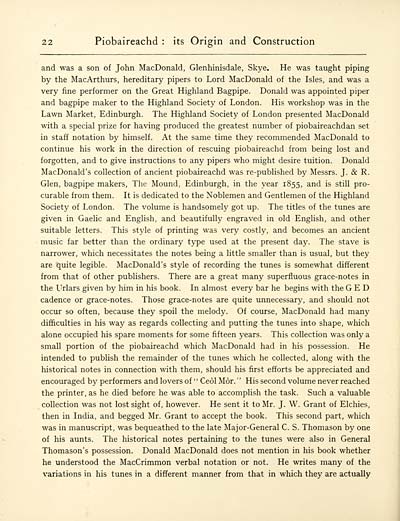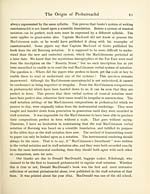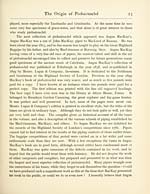Inglis Collection of printed music > Printed text > Piobaireachd [Tus is Alt a'Chiuil-Mhoir]
(28) Page 22
Download files
Complete book:
Individual page:
Thumbnail gallery: Grid view | List view

22 Piobaireachd : its Origin and Construction
and was a son of John MacDonald, Glenhinisdale, Skye. He was taught piping
by the MacArthurs, hereditary pipers to Lord MacDonald of the Isles, and was a
very fine performer on the Great Highland Bagpipe. Donald was appointed piper
and bagpipe maker to the Highland Society of London. His workshop was in the
Lawn Market, Edinburgh. The Highland Society of London presented MacDonald
with a special prize for having produced the greatest number of piobaireachdan set
in staff notation by himself. At the same time they recommended MacDonald to
continue his work in the direction of rescuing piobaireachd from being lost and
forgotten, and to give instructions to any pipers who might desire tuition. Donald
MacDonald's collection of ancient piobaireachd was re-published by Messrs. J. & R.
Glen, bagpipe makers, The Mound, Edinburgh, in the year 1855, and is still pro-
curable from them. It is dedicated to the Noblemen and Gentlemen of the Highland
Society of London. The volume is handsomely got up. The titles of the tunes are
given in Gaelic and English, and beautifully engraved in old English, and other
suitable letters. This style of printing was very costly, and becomes an ancient
music far better than the ordinary type used at the present day. The stave is
narrower, which necessitates the notes being a little smaller than is usual, but they
are quite legible. MacDonald's style of recording the tunes is somewhat different
from that of other publishers. There are a great many superfluous grace-notes in
the Urlars given by him in his book. In almost every bar he begins with the G E D
cadence or grace-notes. Those grace-notes are quite unnecessary, and should not
occur so often, because they spoil the melody. Of course, MacDonald had many
difficulties in his way as regards collecting and putting the tunes into shape, which
alone occupied his spare moments for some fifteen years. This collection was only a
small portion of the piobaireachd which MacDonald had in his possession. He
intended to publish the remainder of the tunes which he collected, along with the
historical notes in connection with them, should his first efforts be appreciated and
encouraged by performers and lovers of " Ceol Mor. " His second volume never reached
the printer, as he died before he was able to accomplish the task. Such a valuable
collection was not lost sight of, however. He sent it to Mr. J. W. Grant of Elchies,
then in India, and begged Mr. Grant to accept the book. This second part, which
was in manuscript, was bequeathed to the late Major-General C. S. Thomason by one
of his aunts. The historical notes pertaining to the tunes were also in General
Thomason 's possession. Donald MacDonald does not mention in his book whether
he understood the MacCrimmon verbal notation or not. He writes many of the
variations in his tunes in a different manner from that in which they are actually
and was a son of John MacDonald, Glenhinisdale, Skye. He was taught piping
by the MacArthurs, hereditary pipers to Lord MacDonald of the Isles, and was a
very fine performer on the Great Highland Bagpipe. Donald was appointed piper
and bagpipe maker to the Highland Society of London. His workshop was in the
Lawn Market, Edinburgh. The Highland Society of London presented MacDonald
with a special prize for having produced the greatest number of piobaireachdan set
in staff notation by himself. At the same time they recommended MacDonald to
continue his work in the direction of rescuing piobaireachd from being lost and
forgotten, and to give instructions to any pipers who might desire tuition. Donald
MacDonald's collection of ancient piobaireachd was re-published by Messrs. J. & R.
Glen, bagpipe makers, The Mound, Edinburgh, in the year 1855, and is still pro-
curable from them. It is dedicated to the Noblemen and Gentlemen of the Highland
Society of London. The volume is handsomely got up. The titles of the tunes are
given in Gaelic and English, and beautifully engraved in old English, and other
suitable letters. This style of printing was very costly, and becomes an ancient
music far better than the ordinary type used at the present day. The stave is
narrower, which necessitates the notes being a little smaller than is usual, but they
are quite legible. MacDonald's style of recording the tunes is somewhat different
from that of other publishers. There are a great many superfluous grace-notes in
the Urlars given by him in his book. In almost every bar he begins with the G E D
cadence or grace-notes. Those grace-notes are quite unnecessary, and should not
occur so often, because they spoil the melody. Of course, MacDonald had many
difficulties in his way as regards collecting and putting the tunes into shape, which
alone occupied his spare moments for some fifteen years. This collection was only a
small portion of the piobaireachd which MacDonald had in his possession. He
intended to publish the remainder of the tunes which he collected, along with the
historical notes in connection with them, should his first efforts be appreciated and
encouraged by performers and lovers of " Ceol Mor. " His second volume never reached
the printer, as he died before he was able to accomplish the task. Such a valuable
collection was not lost sight of, however. He sent it to Mr. J. W. Grant of Elchies,
then in India, and begged Mr. Grant to accept the book. This second part, which
was in manuscript, was bequeathed to the late Major-General C. S. Thomason by one
of his aunts. The historical notes pertaining to the tunes were also in General
Thomason 's possession. Donald MacDonald does not mention in his book whether
he understood the MacCrimmon verbal notation or not. He writes many of the
variations in his tunes in a different manner from that in which they are actually
Set display mode to: Large image | Transcription
Images and transcriptions on this page, including medium image downloads, may be used under the Creative Commons Attribution 4.0 International Licence unless otherwise stated. ![]()
| Special collections of printed music > Inglis Collection of printed music > Printed text > Piobaireachd [Tus is Alt a'Chiuil-Mhoir] > (28) Page 22 |
|---|
| Permanent URL | https://digital.nls.uk/94537844 |
|---|
| Description | Scottish and English songs, military music and keyboard music of the 18th and 19th centuries. These items are from the collection of Alexander Wood Inglis of Glencorse (1854 to 1929). Also includes a few manuscripts, some treatises and other books on the subject. |
|---|
| Description | The Glen Collection and the Inglis Collection represent mainly 18th and 19th century Scottish music, including Scottish songs. The collections of Berlioz and Verdi collected by bibliographer Cecil Hopkinson contain contemporary and later editions of the works of the two composers Berlioz and Verdi. |
|---|

